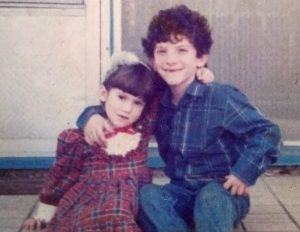As a child, it felt like we never stayed in one place. Throughout my youth and teenage years my family moved continually, and from a young age I was faced with the challenge of adapting to many new environments. In this seemingly constant state of flux, it was important to find ways to attain balance and stability. My father being a Conservative rabbi, my household was steeped in Jewish culture, tradition and ritual—these customs became meaningful ways for our family to feel grounded. As the seasons came and went, the cycle of Jewish holidays followed suit. Coming back year after year to these familiar feasts, songs and practices provided me with a sense of deep connection to my heritage, and ultimately, an indispensable sense of security and belonging.
When I think about Sukkot, the Fall harvest festival taking place this week, countless fond memories envelop my senses. Traditionally, Jews spend as much time as possible inside sukkot—temporary shelters built to commemorate the booths used by the ancient Israelites during their 40-year journey through the Sinai desert.

Our family gathered together in the sukkah each day for meals, inviting in congregants and neighbors to join the celebration of this holiday. As young children, my brother and I brought out our sleeping bags and fell asleep while gazing at the stars underneath the s’chach, the bundles of branches and leaves covering the top of the sukkah. When I think back upon these evenings, I feel the crisp chill of the autumn air. I hear the ritual shaking of the etrog and the lulav—a fragrant bouquet of fruit and branches that symbolizes the harvest and our relationship with God. I delight in the decorative gourds, hay and carefully constructed paper chains lining the sukkah walls. The delicious aroma of cholent cooking in the crock pot makes my mouth water.
For seven days, the sukkah was our home. It brought a sense of nourishment and harmony, a feeling of sanctuary and of slowing down. As a child moving frequently from city to city, the sukkah was a place I could return to again and again each year—no matter where I lived. It was a reminder that my true sense of home could be found in these traditions and within a community grounded in heritage. The rituals, the songs, the blessings—these felt like home to me. I could come back to them year after year to find continued peace and comfort.
Our sages remind us that the truest form of joy is shared joy. Thus, each year we fill our sukkah to the brim with friends and family. The Torah and the Rabbis urged us to extend our communal space even further by inviting the Ushpizin—seven “heavenly guests,” or the founding fathers and mothers of the Jewish people. Each day, we call out their names—Abraham, Isaac, Jacob, Sarah, Rebekah, Rachel and Leah—and ask them to join us in festivity.
We are also taught to open our communities to the needy stranger, widow and orphan. This commandment feels particularly poignant to me this year. As I watch the news with horror and learn of the devastating disasters in Mexico, the humanitarian crisis in East Africa, and the horrific persecution of the Rohingya people in Myanmar, I think of all those who are unrooted and in need of a place of sanctuary.
While I sit in the sukkah this year, my Ushpizin will be the Rohingya, the people of Mexico City and of East Africa. I will utter the names of these communities who have faced tragedy, many of whom will not be returning to their homes. While we know it could never do their pain justice, we invite them into our hearts, and pray for a true end to their suffering.
AJWS’s work in countries and communities changes over time, responding to the evolving needs of partner organizations and the people they serve. To learn where AJWS is supporting activists and social justice movements today, please see Where We Work.
